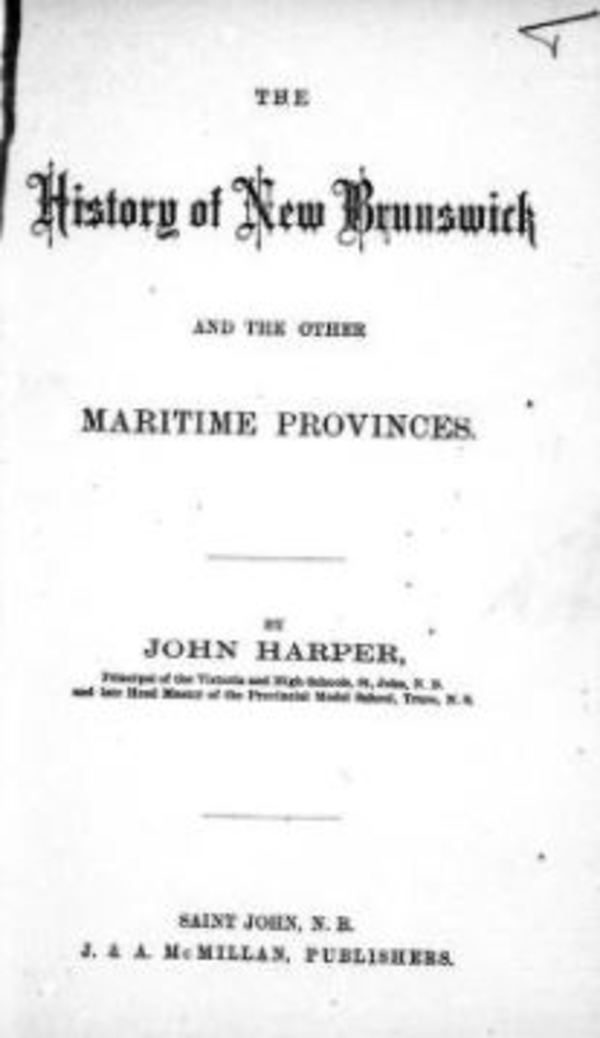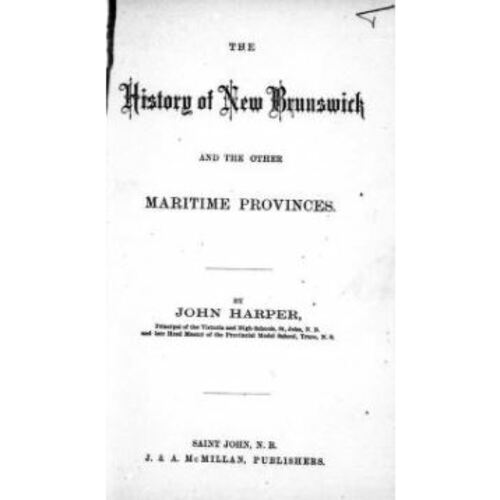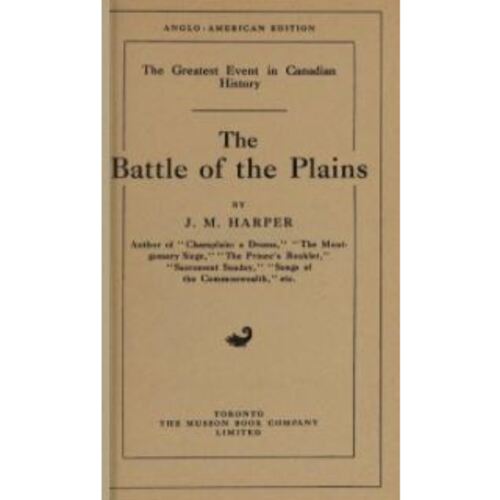
Source: Link
HARPER, JOHN MURDOCH (he occasionally used the pseudonym J. Murdoch Henderson), teacher, educational administrator, office holder, and author; b. 10 Feb. 1845 in Johnstone, Renfrewshire, Scotland, second of the six children of Robert Montgomery Harper and Marion Henderson; m. first, probably 24 Aug. 1866 in Straiton, Ayrshire, Agnes Kirkwood (d. 1883) of Paisley, Scotland; m. secondly 11 Oct. 1887, in Quebec City, Elizabeth Hastings of Saint John; he had five daughters and two sons; d. 28 Feb. 1919 in Quebec City and was buried in Mount Hermon Cemetery, Sillery, Que.
The son of a bookseller, printer, and newspaper publisher in Johnstone, John Harper was educated in parish schools and received his professional training at the Free Church Training College in Glasgow. He taught for a short while in Scotland and after his mother died and his father remarried he immigrated to New Brunswick in 1867 to take up the position of principal at Harkins Academy in Newcastle. His next appointment was as headmaster of the Provincial Model School in Truro, N.S. He subsequently became a teacher in Saint John, and in September 1873 was appointed headmaster at the Girls’ High School. In 1876 this school was transferred to the new Victoria School and Harper served as headmaster of both institutions until the great fire of June 1877 destroyed the building. While a new school was being constructed, he moved to Charlottetown, where he served as superintendent of the free schools in the city and principal of the Normal School. He chose to remain on Prince Edward Island and officially resigned from his post in Saint John in August 1878. In his new appointments he played a crucial role in the implementation of age-graded curricula and in the creation of a workplace favourable to the formally accredited teacher. His first historical work, The history of the Maritime provinces (Saint John), published in 1876, had been authorized as a textbook throughout the Atlantic provinces.
In 1880 he moved to Quebec City to become rector of the High School of Quebec, a private grammar school for boys. The following year he was named a fellow of the Educational Institute of Scotland and in 1882 he was awarded a ba from Queen’s College, Kingston. In 1883 he obtained a phd from Illinois Wesleyan University. He joined the Literary and Historical Society of Quebec, presented papers at its meetings, and in 1885 spoke about its history before the Royal Society of Canada. A member of the St Andrew’s Society, he served as its president from 1885 to 1887.
Harper reorganized the High School of Quebec according to age-grading principles. In 1886 he encouraged the Protestant Board of School Commissioners of the City of Quebec to sign a ten-year agreement to manage the school and he resigned as rector to become secretary-treasurer of the board. That year the Protestant committee of the Council of Public Instruction appointed him inspector of superior schools, in charge of the annual evaluation of Protestant academies and model schools throughout the province on the basis of which the Protestant share of the superior education fund was distributed. Harper and the secretary of the Protestant committee, Elson Irving Rexford*, revised the committee’s regulations to make the receipt of superior school grants conditional on the hiring of professionally trained teachers and on the implementation of graded curricula. The revisions were consolidated by statute in 1888.
Harper pursued his goals by serving as editor of the committee’s journal, the Educational Record of the Province of Quebec (Quebec), from 1887 to 1895; by holding teachers’ institutes; by serving as president of the Quebec Protestant Teachers Association in 1890–91 and as president of the Provincial Association of Protestant Teachers for 1895–96; and by helping to found in 1892 the Dominion Educational Association and using it to promote the establishment of a federal system of public, graded education. He was appointed to the Protestant Central Board of Examiners in 1897. By then he had published several works of poetry, history, and fiction.
At the height of Harper’s influence, his ranking system for superior schools had created crisis conditions throughout Protestant rural municipalities. It had proved impossible to bring the 50 or so academies and model schools under his supervision to a graded uniformity without resistance from teachers and pupils and a consequent manipulation of examination results and grants. A prime target of standardization was St Francis College, Richmond, which enjoyed the same privileges as McGill University but which Harper was determined to reduce to the classification of academy. This demotion was a fait accompli by 1900, but St Francis’s principal, John Alexander Dresser, complained to the Protestant committee. An inquiry into Harper’s inspectorship in ten Protestant school municipalities, including Richmond, in the late summer of 1902 failed to find any specific charges against him.
In the meantime, Sir William Christopher Macdonald, tobacco magnate and benefactor of McGill University, had commissioned an investigation of Protestant education in the province by John Adams, a Scottish educator and promoter of educational reform. Adams made only passing reference to Harper in his Protestant school system in the province of Quebec (Montreal, 1902), exonerated the committee from responsibility for the weak condition of Protestant schools, and supported Macdonald’s proposals for the consolidation of rural schools. Nevertheless, a small number of English Protestant legislators led by William Alexander Weir and representing rural constituencies in the provincial Liberal government of Simon-Napoléon Parent insisted on Harper’s resignation. It was submitted and accepted on 9 May 1903.
In 1901 Harper had published Moral drill for the school room . . . , a secular text based on the Ten Commandments. He later published epic poems which romanticized Canadian and Quebec history, including The Montgomery siege (Quebec), probably in 1908, and The annals of the war . . . (Toronto) in 1913. A fervent imperialist, he preferred to describe English-French relations as a continuation of the “regime de courtoisie” of the past rather than acknowledge the rise of French Canadian nationalism. He was probably more comfortable in a romantic past. With the development of a more professional approach to history, there was little place for his effusive and flowery style. In 1916 he contributed to The naval and military mail bag (Montreal), a souvenir booklet for a rally to aid soldiers’ families. He died at age 74 of a fractured skull caused by a traffic accident.
From the time of his arrival in Canada, John Harper played a central role in the creation of provincial elementary and secondary school systems. His contribution lay in the classification of pupils according to their age and their ability to master age-graded texts, and in the imposition of this system as a prerequisite for secondary school funding. His success as an innovator derived from his unfailing ability to obtain and hold multiple appointments in the public education system. His downfall may be attributed in part to his vulnerability as a colleague of Rexford, a man who made his career by destroying local autonomy in Protestant schools, including their right to hire headmasters for academy and model schools with master’s and phd degrees but without accreditation from normal schools.
Despite his pro-British imperialism and his desire for a pan-Canadian system of public schools, Harper appears to have been held in esteem by French Catholics in Quebec City. Among the English Protestants he wanted most to impress, he seems to have remained a relative outsider, even though his publications were well reviewed and he received considerable support at the time of his forced resignation. There is no doubt, however, that many of his ideas and principles ultimately constituted the mainstream of educational reform.
Several papers presented by John Murdoch Harper before the Literary and Hist. Soc. of Quebec were published in its Trans., new ser., 16 (1881–82)–27 (1906–7), and his report on the society itself, “The annals of an old society,” delivered to the Royal Society of Canada, appears in the latter’s Trans., 1st ser., 3 (1885),
Literary and Hist. Soc. Arch. (Quebec), A3 (High School of Quebec)/A, 1: 228, 232. Private arch., Anne Drummond (Montreal), Anne Drummond, “Rural depopulation, teacher certification, and the course of study in Quebec Protestant superior schools, 1885–1915” (paper presented to the Canadian Hist. of Education Assoc., Toronto, February 1982); Geneal. information concerning the Harper family. Examiner (Charlottetown), 28 Dec. 1877. Montreal Daily Star, 13 May 1903. Patriot (Charlottetown), 16 Aug., 1 Sept., 21 Dec. 1877; 8 June 1878. Sherbrooke Daily Record (Sherbrooke, Que.), 6 Sept. 1902, 9 May 1903. Le Soleil, 1er mars 1919. Board of School Trustees of the City of Saint John, Report, 1873, 1877. Canadian men and women of the time (Morgan; 1898 and 1912). Cyclopædia of Canadian biog. (Rose and Charlesworth), vol.3. Educational Record of the Prov. of Quebec (Quebec; Montreal), 2 (1882): 322; 10 (1890)–19 (1899). G. E. Flower, “A study of the contributions of Dr. E. I. Rexford to education in the province of Quebec” (ma thesis, McGill Univ., Montreal, 1949). Qué., Assemblée Législative, Débats, 1903; Parl., Doc. de la session, 1893–1904, rapports du surintendant de l’Instruction publique, 1892–1903.
Cite This Article
Anne Drummond, “HARPER, JOHN MURDOCH (J. Murdoch Henderson),” in Dictionary of Canadian Biography, vol. 14, University of Toronto/Université Laval, 2003–, accessed February 21, 2026, https://www.biographi.ca/en/bio/harper_john_murdoch_14E.html.
The citation above shows the format for footnotes and endnotes according to the Chicago manual of style (16th edition). Information to be used in other citation formats:
| Permalink: | https://www.biographi.ca/en/bio/harper_john_murdoch_14E.html |
| Author of Article: | Anne Drummond |
| Title of Article: | HARPER, JOHN MURDOCH (J. Murdoch Henderson) |
| Publication Name: | Dictionary of Canadian Biography, vol. 14 |
| Publisher: | University of Toronto/Université Laval |
| Year of publication: | 1998 |
| Year of revision: | 1998 |
| Access Date: | February 21, 2026 |




